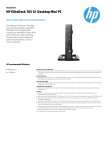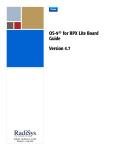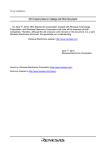Download Anti-Trojan and Trojan Detection with In-Kernel
Transcript
Anti-Trojan and Trojan Detection with In-Kernel Digital Signature testing of Executables. Michael A. Williams Security Software Engineering NetXSecure NZ Limited. http//www.nxs.co.nz April 16, 2002 ABSTRACT This paper presents a somewhat compute expensive way to detect or deny the activity of Trojan or otherwise modified executable files that may have been tampered with in any way thus taking a "that which is not expressly permitted is denied" stance. It then provides a description of two reference implementations with a summary of the implications and some obvious limitations. Included are appendices containing gprof flat and call graph profiles from kgmon and gprof Kernel profiling sessions with references for further reading and or study on the included topics. Version 0.06 1 Contents 1 In-Kernel signature checking of executables 1.1 Why . . . . . . . . . . . . . . . . . . . . . . . . . . . . . . . . . 1.2 How . . . . . . . . . . . . . . . . . . . . . . . . . . . . . . . . . 1.3 Costs . . . . . . . . . . . . . . . . . . . . . . . . . . . . . . . . 3 3 3 4 2 Reference Implementations 2.1 OpenBSD . . . . . . . . . . . . . . . . . . . . . . . . . . . . . . 2.2 FreeBSD . . . . . . . . . . . . . . . . . . . . . . . . . . . . . . 2.3 Signature Database . . . . . . . . . . . . . . . . . . . . . . . . . 4 4 5 5 3 Summary 3.1 Is it worth it . . . . . . . . . . . . . . . . . . . . . . . . . . . . . 3.2 Where to next . . . . . . . . . . . . . . . . . . . . . . . . . . . . 3.3 Kernel Profiling . . . . . . . . . . . . . . . . . . . . . . . . . . . 5 5 6 6 A Kernel Profiles A.1 Flat Profiles for Compilation Loop . . . . . . . . . . . . A.2 Flat Profile for Workstation . . . . . . . . . . . . . . . . A.3 Call Graph Profiles . . . . . . . . . . . . . . . . . . . . A.3.1 Generic Kernel in Compilation Loop . . . . . . A.3.2 Signed Exec Kernel Option in Compilation Loop A.3.3 Signed Exec Kernel Option - Workstation . . . . . . . . . . 7 7 8 9 9 10 11 B References B.1 books . . . . . . . . . . . . . . . . . . . . . . . . . . . . . . . . B.2 papers . . . . . . . . . . . . . . . . . . . . . . . . . . . . . . . . B.3 training courses . . . . . . . . . . . . . . . . . . . . . . . . . . . 12 12 12 12 2 . . . . . . . . . . . . . . . . . . . . . . . . 1 In-Kernel signature checking of executables 1.1 Why Why should we do this? Due to the prolific nature and rampant increase of attacks achieved by the successful compromise of a network connected computer followed by the installation of Trojan-ed binaries, root kits, worms and virus payloads the system administrator or security manager has a very difficult task. Once you have decided that even the best and most secure system is capable of or has been compromised then the next thing to consider is how do you know that it has happened and how quickly can you react? It would be nice to know that an attempt has been made to execute a file that has been tampered with and that the affected computer system has either warned you of this or has denied the execution depending on which you prefer1 . One could ask why not simply run executables from read only media to make executables tamper proof or in the case of *BSD systems use of the immutable file flags2 which in both cases require physical access to the console to bypass. One answer is in the debate that if a system is compromised and the attacker is not able to install a root kit or tamper with executable files then how does the owner or administration team know that the system has been compromised? In respect to special case systems such as sacrificial hosts or honey pots there is an obvious advantage to knowing as quickly as possible that an attack is in progress, on that note sacrificial hosts or honey pots are obvious candidates for the alerts generated from warnings. Firewall’s, routers and or VPN endpoints are suitable candidates for the deny stance. 1.2 How When the Kernel is carrying out a series of checks before executing a binary or script3 file it would seem to be an ideal opportunity to optionally carry out a check to see if the file has been tampered with by doing a signature calculation 4 and comparison against a highly secured signature database with a resulting decision to allow or deny the execution based on the result. It also follows that the Kernel 1 Read the section titled How for an explanation man chflags(1) 3 As well as any Interpreter 4 eg. man md5(1) 2 3 could decide to proceed with the execution of a file that does not pass the comparison and simply generate a warning with an audit trail written in either case. 1.3 Costs Does the ongoing massive increases in CPU processing power and memory bandwidth mean that the cost benefit ratio of calculating and comparing a digital signature for each and every invocation of an executable or script file is acceptable. Have a look at the Kernel profile results which show forty percent (40%) 5 and higher of the running Kernel in MD5Transform6 for a system in a kernel compilation loop as compared to point seven of a percent (0.7%) 7 for a power workstation running X Windows with ten (10) active virtual desktops although not a high invocation rate of the exec system call. The decision must come down to the the cost of having the information that an attacker has got far enough to tamper with executable files versus the cost of not knowing. 2 Reference Implementations 2.1 OpenBSD OpenBSD8 was chosen for the first reference implementation due to its well known high security standards and a clean efficient Kernel compilation environment. The implementation is mainly within the Exec system call as in-line code that calls the Kernel library MD5 routines to calculate a signature for the intended executable file. The BSD securelevel9 is used to decide between no audit, audit and warnings or audit and deny. A check is carried out to ensure that the signature database is either mounted on a cd9660 type file system or alternatively a read only mounted local FFS file system with the signature files set immutable10. The wiring of loadable Kernel module types syscall and exec have been disabled to prevent a simple and obvious bypass of signature testing within the exec system call, with the side affect that these loadable Kernel modules are not available. 5 See section A.1 on page 7 MD5 was chosen in the instance, SHA1 could be a better choice 7 See section A.2 on page 8 8 http://www.openbsd.org 9 man init(8) 10 man chflags(1) 6 4 The reference code11 is available12 as a set of patch files to the Kernel source tree for OpenBSD 3.0 Release and is compiled in by Kernel Option with behavior controlled by securelevel settings. 2.2 FreeBSD FreeBSD13 was chosen for the second reference implementation. Again the reference code14 is available15 as a set of patch files to the Kernel source tree for FreeBSD 4.5 Release. Almost identical in-line source code with the same compilation included by Kernel Option and behavior controlled by securelevel. FreeBSD loadable Kernel module functionality is disabled if the Kernel is compiled with the signed exec option on, this needs to change to signature checking of the LKM before loading as done with executables. 2.3 Signature Database The reference implementation uses a supplied script to build an MD5 signature database which needs to be either copied to a separate local FFS16 partition to be mounted read only after setting the entire signature database to immutable with chflags17 or alternatively written to CD-ROM. 3 Summary 3.1 Is it worth it On a busy server or any system that has a high invocation rate of the exec system call with short duration programs the cost could easily be prohibitive and for any system that is updated regularly18 the burden of updating signature database’s could also be considered too much effort. 11 Currently Intel i386 architecture only http://www.trojanproof.org/sigexec-obsd3.0r-0.2.tgz 13 http://www.freebsd.org 14 Currently Intel i386 architecture only 15 http://www.trojanproof.org/sigexec-fbsd4.5r-0.2.tgz 16 man mount 17 man chflags(1) 18 Including security patches! 12 5 The intention of this exercise has not been to create a system that can not be defeated, rather a way of making it harder for the casual break in to go undetected and for that detection process to occur very very quickly. 3.2 Where to next Loadable Kernel Modules and shared libraries could and should be signature tested as well. Performance improvements are an area that has not really been addressed however performance data has been obtained to benchmark the costs of doing signature checking of executables as well as providing a baseline for performance improvements such as pre-loading the executable19 and maybe caching signatures which unfortunately raise further security issues. A Linux 2.2.4 Kernel implementation is in progress. 3.3 Kernel Profiling Kgmon20 and Gprof21 have been used along with custom Kernels compiled and configured22 for profiling23 . The results are going to vary dramatically based on almost as many variables as there are variations in system types and possible mixes of applications so no information has been provided on the hardware used to conduct the tests and no tests have been run taking advantage of hardware crypto yet. The indications are that the faster CPU’s and more modern hardware handles this type of workload with ease compared to older generation systems. 19 Into the VM system kgmon(8) 21 gprof(1) 22 config(8) 23 See section B.2 on page 12 20 6 A Kernel Profiles A.1 Flat Profiles for Compilation Loop *** FreeBSD 4.5 Release Kernel profiles. *** Generic Kernel with profiling. *** Flat profile first 8 entries for the entire kernel. % cumulative time seconds 7.6 64.15 6.8 121.41 5.3 166.36 4.9 208.04 4.5 246.60 4.1 281.22 3.8 313.29 3.5 343.36 self self seconds calls ms/call 64.15 57.26 1593655 0.04 44.96 101883964 0.00 41.68 3477950 0.01 38.56 36264396 0.00 34.62 3643431 0.01 32.07 4769164 0.01 30.07 3202573 0.01 total ms/call 0.04 0.00 0.01 0.00 0.01 0.11 0.02 name __mcount [18] generic_copyout [20] splx <cycle 1> [21] trap <cycle 1> [25] lockmgr <cycle 1> [24] i486_bzero [27] syscall2 [4] vm_fault <cycle 1> [16] *** Generic Kernel with SIGNED_EXEC option enabled and profiling. *** Flat profile first 8 entries for the entire kernel. % cumulative time seconds 42.2 1085.12 4.2 1192.39 3.9 1292.14 2.4 1353.34 2.3 1412.49 2.3 1470.96 2.0 1523.03 1.9 1571.79 self seconds 1085.12 107.27 99.75 61.19 59.16 58.47 52.07 48.76 self total calls ms/call ms/call name 192540406 0.01 0.01 MD5Transform [6] __mcount [19] 205885250 0.00 0.00 generic_bcopy [20] 173071759 0.00 0.00 splx <cycle 1> [22] 54135072 0.00 0.00 lockmgr <cycle 1> [23] 298346 0.20 0.20 default_halt [25] 197968791 0.00 0.00 i486_bzero [26] 7550914 0.01 0.27 syscall2 [3] Note the impact of the SIGNED_EXEC option where the MD5Transform routine occupies 42.2% of the running kernel time. 7 A.2 Flat Profile for Workstation *** FreeBSD 4.5 Release Kernel profiles. *** Generic Kernel with SIGNED_EXEC option enabled and profiling. *** Flat profile first 20 entries for the entire kernel. % cumulative time seconds 23.0 54.54 21.9 106.63 12.7 136.89 3.9 146.26 3.8 155.37 2.2 160.63 2.2 165.83 2.1 170.88 1.7 174.91 1.2 177.78 1.1 180.37 1.1 182.89 1.0 185.28 0.9 187.33 0.9 189.38 0.8 191.39 0.8 193.36 0.7 194.94 0.6 196.39 0.6 197.77 self seconds 54.54 52.09 30.27 9.37 9.11 5.26 5.20 5.04 4.03 2.87 2.59 2.52 2.39 2.05 2.04 2.01 1.97 1.58 1.45 1.37 calls 15068819 122765174 6365848 63148 2591575 10784660 44242485 449072 44242485 57172474 16339174 47628483 14378842 7352548 8702286 33540 1672633 1888269 1073088 self ms/call 0.00 0.00 0.00 0.14 0.00 0.00 0.00 0.01 0.00 0.00 0.00 0.00 0.00 0.00 0.00 0.06 0.00 0.00 0.00 8 total ms/call 0.00 name default_halt [8] __mcount [9] 0.00 splx <cycle 1> [14] 0.00 i8254_get_timecount [23] 0.15 xe_intr [26] 0.03 selscan [6] 0.01 syscall2 [2] 0.00 sopoll [12] 0.01 spl0 <cycle 1> [38] 0.00 soo_poll [11] 0.00 fdrop <cycle 1> [43] 0.00 generic_copyin [44] 0.00 selrecord [48] 0.00 lockmgr <cycle 1> [53] 0.01 Xint0x80_syscall [4] 0.00 generic_copyout [55] 0.06 xe_pio_write_packet [57] 0.00 MD5Transform [47] 0.05 select [5] 0.01 sosend [30] A.3 Call Graph Profiles A.3.1 Generic Kernel in Compilation Loop *** Call Graph for system call Execve. *** Details for child calls from execve not shown. index %time self descendents [1] 0.00 100.0 0.97 0.67 0.20 1.23 0.12 1.12 0.12 0.15 0.34 0.11 0.25 0.25 0.02 0.17 0.21 0.12 0.09 0.10 0.07 0.07 0.07 0.04 0.03 0.02 0.01 0.00 0.00 0.00 0.00 0.00 0.00 57.40 39.98 5.71 2.67 1.01 0.00 0.72 0.65 0.13 0.36 0.10 0.10 0.27 0.07 0.00 0.05 0.03 0.01 0.00 0.00 0.00 0.00 0.00 0.00 0.00 0.00 0.00 0.00 0.00 0.00 called/total called+self called/total parents name index children 46819/46819 syscall2 (637) 46819 execve [1] 32008/32008 exec_elf_imgact [2] 47177/880963 namei [7] 32008/32008 exec_copyout_strings [11] 32366/39552 exec_map_first_page [23] 48628/1204021 generic_bcopy [13] 32366/39552 exec_check_permissions [28] 32008/32008 setregs [37] 64374/78101428 vrele <cycle 1> [90] 32008/32008 elf_freebsd_fixup [50] 46819/78101428 kmem_alloc_wait <cycle 1> [225] 46819/78101428 kmem_free_wakeup <cycle 1> [340] 32366/39552 exec_unmap_first_page [60] 32366/78101428 ufs_vnoperate <cycle 1> [22] 32008/32008 execsigs [86] 23029/78101428 wakeup <cycle 1> [246] 16620/78101428 malloc <cycle 1> [165] 32008/32008 fdcloseexec [120] 32366/32366 exec_shell_imgact [146] 32008/32008 exec_aout_imgact [153] 32366/554391 NDFREE [139] 32008/32008 stopprofclock [200] 32008/316167 knote [209] 32008/1590251 vref [163] 48628/1204021 bcopy [218] 667/78101428 free <cycle 1> [130] 1/32 change_euid [567] 1/105 crcopy [563] 1/164 setsugid [872] 1/1 setugidsafety [978] ----------------------------------------------- 9 A.3.2 Signed Exec Kernel Option in Compilation Loop *** Call Graph for system call Execve. *** Details for child calls from execve not shown. index %time self descendents [1] 0.00 100.0 5.58 22.77 0.73 5.60 0.02 0.32 0.09 1.35 1.29 1.19 0.11 0.05 0.12 0.59 0.05 0.64 0.40 0.11 0.14 0.28 0.28 0.02 0.20 0.20 0.20 0.22 0.14 0.12 0.10 0.09 0.09 0.08 0.03 0.02 0.02 0.02 0.01 0.00 0.00 0.00 0.00 0.00 called/total called+self called/total parents name index children 0.00 48882/48882 syscall2 (763) 1376.10 48882 execve [1] 1219.23 3026100/3094706 MD5Update [2] 44.87 33918/33918 exec_elf_imgact [7] 24.13 3060376/3060376 vn_rdwr [9] 28.23 34303/34303 MD5Final [11] 9.09 83570/1368992 namei [14] 5.90 548848/556414 snprintf [18] 0.65 33918/33918 exec_copyout_strings [35] 0.43 223021/121143509 malloc <cycle 1> [185] 0.40 206498/121143509 free <cycle 1> [128] 1.10 34303/41849 exec_map_first_page [40] 1.07 102936/102936 sprintf [48] 0.79 34303/41849 exec_check_permissions [49] 0.20 102497/121143509 vrele <cycle 1> [86] 0.71 68633/68633 log [60] 0.00 548848/548848 strcat [67] 0.13 68552/121143509 vop_defaultop <cycle 1> [126] 0.39 33918/33918 elf_freebsd_fixup [81] 0.34 33918/33918 setregs [84] 0.09 48882/121143509 kmem_alloc_wait <cycle 1> [289] 0.09 48882/121143509 kmem_free_wakeup <cycle 1> [455] 0.29 34303/41849 exec_unmap_first_page [99] 0.07 34303/121143509 ufs_vnoperate <cycle 1> [34] 0.07 34276/121143509 vop_stdunlock <cycle 1> [105] 0.06 33918/121143509 knote <cycle 1> [244] 0.00 33918/33918 execsigs [132] 0.05 24509/121143509 wakeup <cycle 1> [279] 0.00 68579/1010369 NDFREE [174] 0.01 33918/33918 fdcloseexec [190] 0.00 33918/33918 exec_aout_imgact [200] 0.00 34303/34303 strncmp [203] 0.00 34303/34303 exec_shell_imgact [220] 0.00 33918/33918 stopprofclock [298] 0.00 51121/205885250 generic_bcopy [4] 0.00 34303/34303 MD5Init [347] 0.00 33918/2499349 vref [192] 0.00 34303/555516 strcmp [431] 0.00 51121/205810944 bcopy [13] 0.00 6/194 crcopy [657] 0.00 2/52 change_euid [679] 0.00 6/292 setsugid [682] 0.00 6/6 setugidsafety [1136] ----------------------------------------------- 10 A.3.3 Signed Exec Kernel Option - Workstation *** Call Graph for system call Execve. *** Details for child calls from execve not shown. index %time self descendents [1] 0.00 100.0 0.00 0.02 0.00 0.00 0.00 0.00 0.00 0.00 0.00 0.00 0.00 0.00 0.00 0.00 0.00 0.00 0.00 0.00 0.00 0.00 0.00 0.00 0.00 0.00 0.00 0.00 0.00 0.00 0.00 0.00 0.00 0.00 0.00 0.00 0.00 0.00 0.00 0.00 0.00 0.00 0.00 2.50 2.34 0.06 0.02 0.02 0.01 0.01 0.00 0.00 0.00 0.00 0.00 0.00 0.00 0.00 0.00 0.00 0.00 0.00 0.00 0.00 0.00 0.00 0.00 0.00 0.00 0.00 0.00 0.00 0.00 0.00 0.00 0.00 0.00 0.00 0.00 0.00 0.00 0.00 0.00 called/total called+self called/total parents name index children 341/341 syscall2 (650) 341 execve [1] 26245/27283 MD5Update [2] 337/389 MD5Final [6] 335/335 exec_elf_imgact [10] 26550/26550 vn_rdwr [13] 5392/8061 snprintf [15] 690/613673 namei [17] 325/325 exec_copyout_strings [33] 706/1716 sprintf [35] 706/1213 log [36] 341/479 kmem_alloc_wait [30] 337/475 exec_map_first_page [29] 2347/177610456 malloc <cycle 1> [362] 2027/177610456 free <cycle 1> [314] 337/475 exec_check_permissions [32] 337/337 exec_aout_imgact [44] 5392/5392 strcat [47] 341/479 kmem_free_wakeup [38] 1252/177610456 ufs_vnoperate <cycle 1> [54] 967/177610456 vrele <cycle 1> [106] 323/323 elf_freebsd_fixup [61] 325/325 fdcloseexec [67] 337/475 exec_unmap_first_page [75] 650/2331411 generic_bcopy [4] 325/177610456 knote <cycle 1> [144] 151/177610456 wakeup <cycle 1> [242] 642/582563 NDFREE [102] 325/325 setregs [139] 337/103548 strncmp [146] 325/1226218 vref [89] 650/2331411 bcopy [9] 12/176 crcopy [190] 4/51 change_euid [225] 2/15775 suword [46] 337/389 MD5Init [880] 325/325 stopprofclock [908] 325/325 execsigs [904] 12/12 exec_shell_imgact [1138] 12/280 setsugid [921] 12/12 setugidsafety [1142] ----------------------------------------------- 11 B References B.1 books McKusick, Marshall Kirk, Keith Bostic, Michael J Karels, and John Quarterman. The Design and Implementation of the 4.4BSD Operating System 24 . B.2 papers http://docs.freebsd.org/44doc/papers/kerntune.html B.3 training courses Unix Kernel Internals: Data Structures and Algorithms http://www.mckusick.com/courses/introdescrip.html FreeBSD Kernel Internals: An Intensive Code Walkthrough http://www.mckusick.com/courses/advdescrip.html 24 Addison-Wesley, 1996. ISBN 0-201-54979-4 12



















